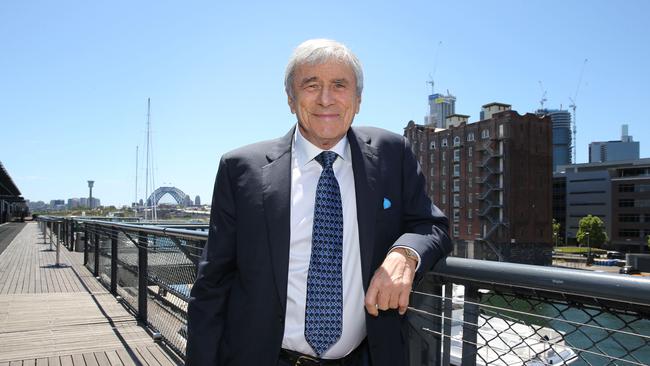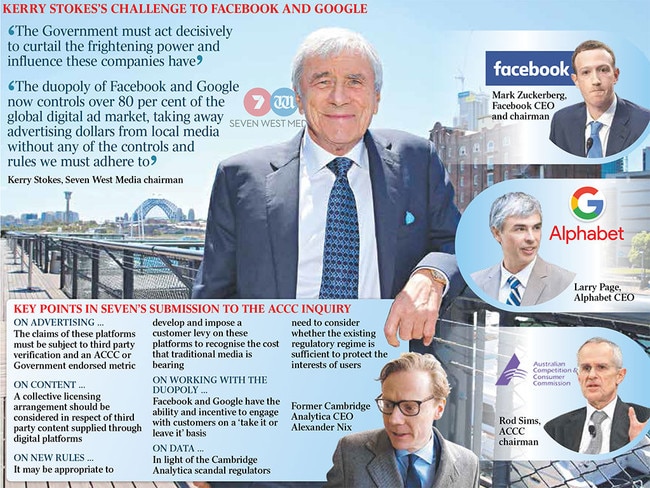Seven takes battle to tech giants
Kerry Stokes has called on the Turnbull government to take ‘serious action’ against Facebook and Google.

Kerry Stokes has called on the Turnbull government to take “serious action” against Facebook and Google, proposing strict new controls and rules including payment for content, and customer service obligations, similar to the model used in the telecommunications market.
In an exclusive interview with The Australian, the Seven West Media chairman urged the government to seize the opportunity of a competition regulator inquiry into the digital media market as a way to tackle the enormous concentration of power amassed by the tech titans in Australia.
“The government must act decisively to curtail the frightening power and influence these companies have,” says Mr Stokes, adding “with over two billion users Facebook now reaches to almost every corner of the Earth”.
The Australian has exclusively obtained Seven’s 20-page submission to the Australian Competition & Consumer Commission, which is due to issue a preliminary report in December.
In his first public comments since the Cambridge Analytica data leaks, Mr Stokes says the incident should accelerate government scrutiny of Facebook after it emerged the data firm had gathered millions of profiles to influence voter choice
“Last year, Facebook launched an artificial intelligence tool that scans the posts of its users,” he says. “Facebook says it is looking for patterns of suicidal behaviour, but won’t allow people to opt out, which I believe is delving too far into people’s privacy.”

Facebook is already under the microscope for its role in allowing Russian-backed groups to use its tools to sway US political debate before and after the 2016 presidential race.
“God knows what else they can find out and intrude upon in people’s lives,” he says.
“Facebook also enables the manipulation of people’s emotions, attitudes and voting by allowing third parties to disseminate fake news, but won’t pay legitimate media companies for quality content.”
After Facebook recently admitted it scans users’ private messages, Mr Stokes says the revelations show the company routinely pretends it knows less than it does.
“Facebook has a history of not paying its fair share of tax, failing to protect its users’ data and of secrecy, stonewalling and denying wrongdoing until forced to.”
As part of a public inquiry into the impact of digital platforms on media and advertising markets in Australia, the ACCC has called on media companies, advertisers, agencies and other players to submit concerns and ideas.
Seven’s executive summary outlines six key issues, and details solutions to address the business, economic and societal problems created by the stunning ascent of the American tech companies.
Among the challenges is Facebook’s incursion into the local advertising market.
The social network is projected to generate $US55 billion ($72bn) in advertising revenue globally in financial year 2018, a figure 3.4 times more than the ad revenue of all Australia’s media companies.
While Facebook does not disclose revenue on a country-by-country basis in quarterly results, media buyers and analysts estimate Facebook generated almost $1bn in Australia last year.
“The duopoly of Facebook and Google now control over 80 per cent of the global digital ad market, taking away advertising dollars from local media without any of the controls and rules we must adhere to, creating an uneven playing field,” says Mr Stokes.
Following a series of embarrassing disclosures by Facebook that revealed it repeatedly inflated the metrics used to measure the effectiveness of ads, Seven points out in its paper that Google and Facebook are not “subjected to the same rigorous and independent auditing” as traditional media companies.
In Seven’s submission, the network puts forward a proposal.
“Seven submits that the claims of these platforms must be subject to third-party verification and an ACCC or government-endorsed metric so that advertisers can ask for reliable and relevantly comparable consumer reach information.”
While Facebook and Google have presided over an enormous shift in ad dollars from traditional media companies to their platforms, they do not pay for the content provided by these operators.
Seven calls for the tech giants to pay a fee, much like carriage fees paid by cable companies, an idea raised by Rupert Murdoch, executive chairman of News Corporation, publisher of The Australian.
Such a model would provide a new way to sustain the long-term future of content makers from journalists and local screenwriters to television networks and production houses, says Mr Stokes.
“Commercial TV networks spend about $2bn on content each year — 75 per cent of which is on local content,” he says.
“Networks support more than 15,000 jobs while local rules and Code of Practice require us to produce a great deal of local content, present factual information accurately and ensure that viewpoints in our programming are fairly represented — responsibilities Facebook does not have.
“At the same time, Facebook and Google have become unavoidable trading partners for any content business to reach and market to digital audiences, abusing their market power to advantage themselves, which warrants serious action.”
To level the playing field, Seven argues in its submission there “is no reason why digital platforms ... should be using traditional media content without payment”.
Seven warns that the current situation is not tenable, and submits that a “collective licensing arrangement should be considered”. Additionally, Seven has submitted that “it may be appropriate to develop and impose a customer service obligation levy on these platforms to recognise the cost that traditional media is bearing”.
Of trading terms with Facebook and Google, Seven says “they serve as an important source of traffic for content providers”.
Seven is concerned, however, that Facebook and Google have “the ability and incentive to engage with customers on a ‘take it or leave it’ basis”.
Commenting on Facebook’s and Google ’s harvesting of valuable personal data from Australians, Seven argues the “data Google and Facebook have amassed provides substantial barriers to entry”, and “reinforces” their dominance.
Australia’s privacy commissioner recently launched an investigation into Facebook’s use of personal data.
Seven also raises concerns about the way the tech giants use their considerable financial firepower to acquire start-ups and stifle innovation.
The Australian last year uncovered confidential documents produced by Facebook’s executives that discussed targeting ads at depressed children.






To join the conversation, please log in. Don't have an account? Register
Join the conversation, you are commenting as Logout